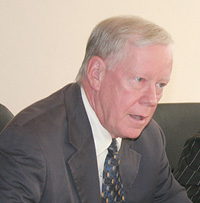US to Support the Kenyan Dream -Ranneberger

What the United States wants for Kenya is what Kenyans want for themselves: a prosperous democratic future that will advance the well-being of all Kenyans.
The crisis that Kenya suffered last year was a watershed that brought into sharp relief the underlying problems that have plagued the country for nearly 50 years: ethnic politics, inequitable distribution of wealth, and the culture of impunity that has enabled violence and corruption to proliferate. As a friend and partner of Kenya, we were glad, along with others, to stay at the side of the Kenyan people at that hour of great need. But it is the Kenyan people themselves who played the most important role in ending the crisis. Demonstrating a true democratic spirit that reflected high expectations, the Kenyan people mobilized as never before. Ordinary Kenyans, civil society, religious groups, the private sector, and the media all played important roles. The dynamic and vigorous way in which Kenyans came together galvanized pressure for the creation of a coalition government.
|
|
| Ranneberger: US Envoy to Kenya |
That reform agenda is far-reaching, embracing constitutional revision, establishment of an independent electoral commission, and creation of a Special Tribunal to investigate and, if warranted by the evidence, prosecute those suspected of involvement in post-electoral violence. The reform agenda also embraces land reform, police reform, and the fight against corruption, among other areas.
Although this is a very ambitious agenda, many Kenyans have told me that it can be carried out if leaders demonstrate the political will to do so, and if the Kenyan people insist on action. There can be no return to the ways of the past, and the culture of impunity must not be allowed to persist. Half measures – whether with respect to institutional reforms or to fighting the scourge of corruption – will not be credible to the Kenyan people or to the international community. We stand with the Kenyan people who are insisting that the corruption cases which have come to light be fully investigated and perpetrators prosecuted. It is not a question of rounding up the usual suspects and rearranging positions, and then doing business as usual. The tragic crisis of last year has opened up an unparalled opportunity to bring about fundamental change – and I believe that nothing less than fundamental change will satisfy the Kenyan people.
If carried out, that change will lay the basis for stronger democratic institutions and a better future for all Kenyans. There is in fact no alternative to the reform agenda, for without it Kenya faces the specter of even greater trouble in the future, and none of us want to see that.
While Kenyans are impatient for change, I would argue against those that might become cynical and those naysayers who see the glass as half empty. Let there be criticism, but let it be realistic and constructive. The ethnic attitudes and the culture of impunity that have prevailed in Kenya cannot be altered overnight. However, implementation of the reform agenda will launch a process of fundamental change and give Kenyans confidence in the future of their great country. Although we all want to see more expeditious implementation, progress is being made on the reform agenda.
In his inaugural address, President Obama talked to Americans about the necessity for change to address the problems we face. In thinking about the agenda for fundamental change in Kenya, I want to recall what then Senator Obama said when he addressed students at the University of Nairobi in 2006.
Senator Obama stated that: “In the end, if the people cannot trust their government to do the job for which it exists - to protect them and to promote their common welfare - all else is lost. And this is why the struggle against corruption is one of the great struggles of our time.”
He went on to say that, based on his observations, “the Kenyan people are crying out for real change…and many Kenyans seemed to be sending (signals) of dissatisfaction with the pace of reform, and real frustration with continued tolerance of corruption at high levels. Ethnic-based tribal politics has to stop. It is rooted in the bankrupt idea that the goal of politics or business is to funnel as much of the pie as possible to one's family, tribe, or circle with little regard for the public good. It stifles innovation and fractures the fabric of the society. Of course, in the end, one of the strongest weapons your country has against corruption is the ability of you, the people, to stand up and speak out about the injustices you see. The Kenyan people are the ultimate guardians against abuses. In today's Kenya - a Kenya already more open and less repressive than in my father's day - it is that courage that will bring the reform so many of you so desperately want and deserve.”
Those words were prescient then and remarkably relevant now. While Kenya’s leaders must demonstrate the necessary vision and political will, you the Kenyan people must drive implementation by exercising your democratic rights in a peaceful way. We will offer help and stand by your side as you do so.
By Michael Ranneberger
Excerpted from his remarks at the Conference “One

